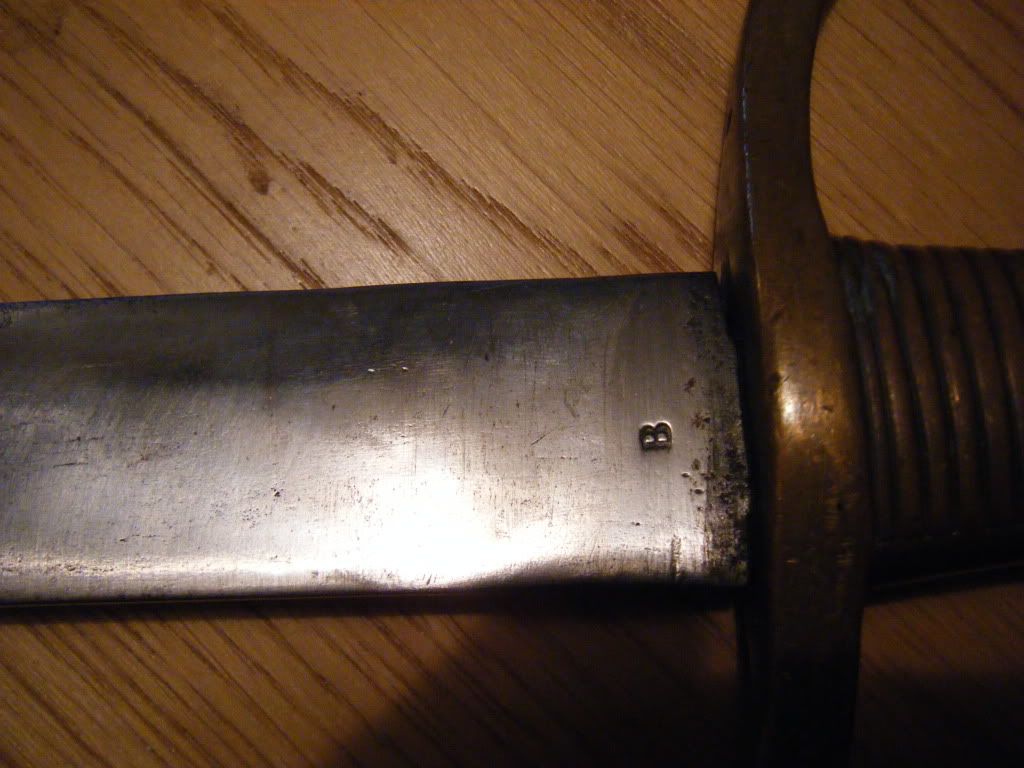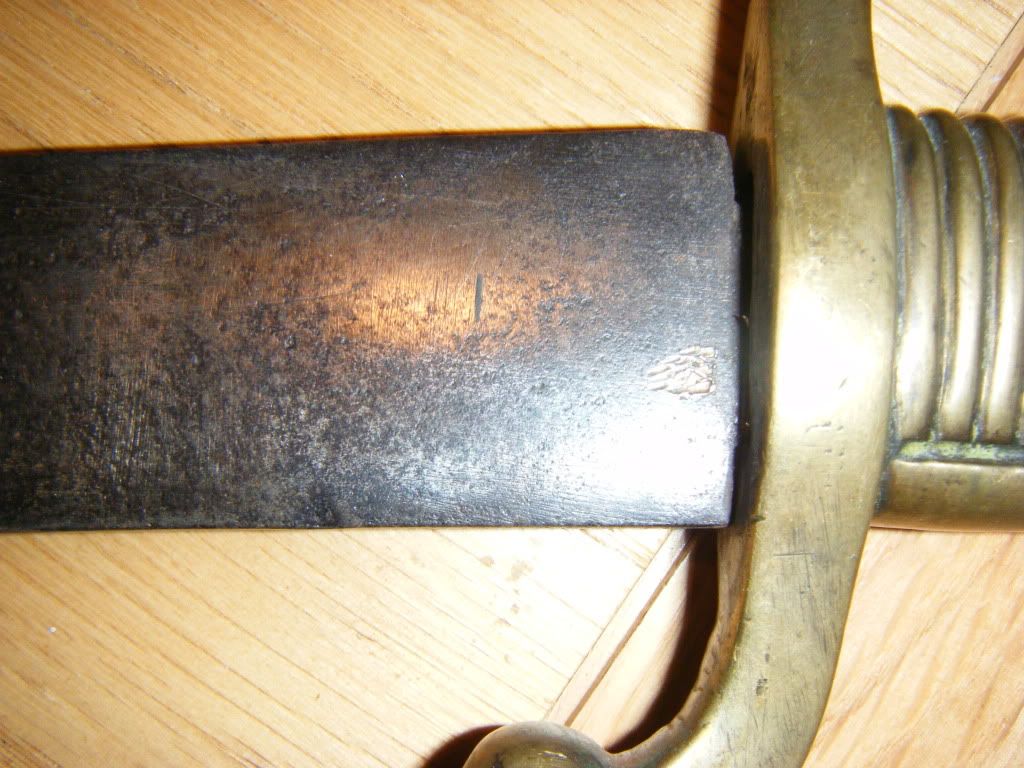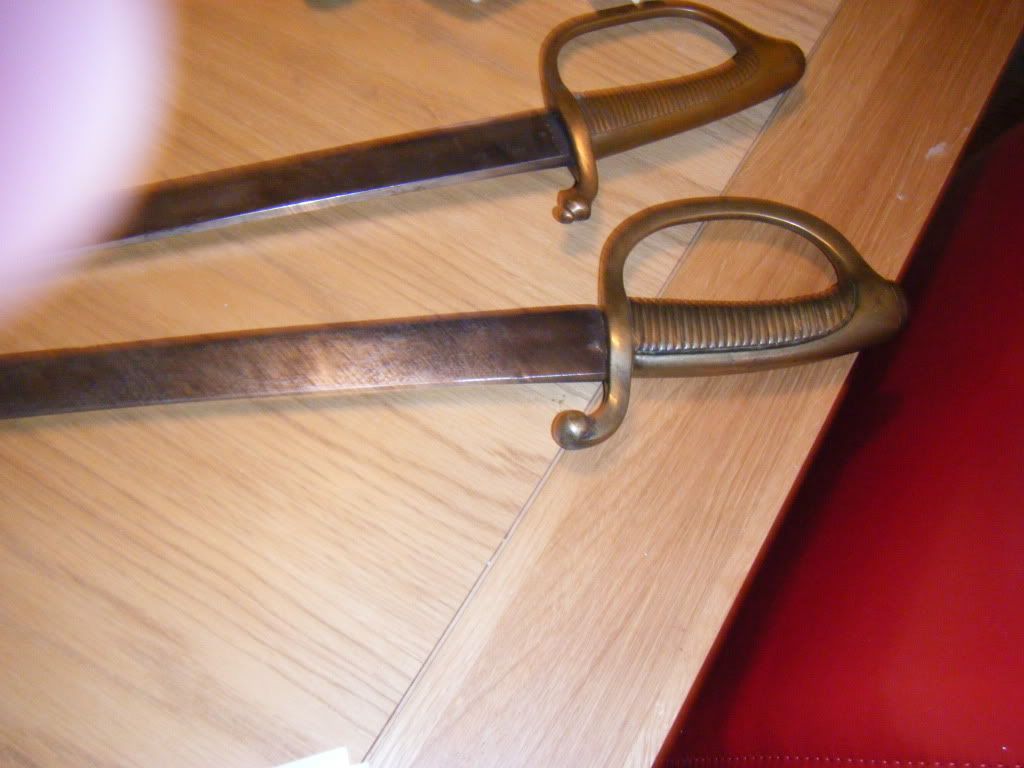
 |
|
|
#1 |
|
Member
Join Date: Oct 2010
Location: yeovil, somerset, uk
Posts: 75
|
Hi, can anyone please help ID these two infantry briguets. one is marked with a B stamped on the blade and a further stamp on the hand guard which is too hard to make up. The second is also stamped on the blade and looks like a set of V,s its very hard to make out. any help would be good, michael
  
|
|
|

|
|
|
#2 |
|
(deceased)
Join Date: Dec 2004
Location: Portugal
Posts: 9,694
|
Hi Michael,
Are there no marks on these briquets? ... like on the guards or knuckle guards? |
|
|

|
|
|
#3 |
|
Member
Join Date: Oct 2010
Location: yeovil, somerset, uk
Posts: 75
|
Hi, there is one mark on the knuckle guard but its been badly rubbed and i can,t make it out. this 2nd mark is on the briguet with the letter B stamped on the blade, it also as a less rounded guard then the 2nd briguet. michael
|
|
|

|
|
|
#4 |
|
Member
Join Date: Oct 2010
Location: yeovil, somerset, uk
Posts: 75
|
Hi with a better set of glasses I have found a stamped number 3 on the underside of the handle of the weapon with a B mark on the blade, also a stamped letter M or N also on the underside of the handle. anyone have any ideas. michael
|
|
|

|
|
|
#5 |
|
(deceased)
Join Date: Dec 2004
Location: Portugal
Posts: 9,694
|
C'mon guys.
Pull out your knowledge and give Michael some coments about these two pieces. |
|
|

|
|
|
#6 |
|
Arms Historian
Join Date: Dec 2004
Location: Route 66
Posts: 9,954
|
It seems the lowly briquet, one of the commonest of 'other ranks' weapons in volume, for that very reason is often the most difficult to effectively identify. These cast brass hilt hangers seem to have come about in around the end of the 18th century and were used by virtually every major power as a cheap, servicable sidearm. They were known readily as the French 'briquet' and copied by Great Britain as artillery gunners swords, used also by Russia, Sweden, Denmark, Germany in the various states especially Prussia, Spain, and probably others I have not named.
These were in use throughout the 19th century as far as is known, most likely in colonial circumstances after they became obsolete with regulation weapons in these armies. Since British blades typically had the board of ordnance marks on the blade, that can be eliminated....but these markings, most likely issue and controllers stamps it would be hard to attribute. There is always the possibility these are later reissues, incredible as it might seem as there were in various circumstances probably tons of these type weapons around. In the early 20th century, Francis Bannerman bought these huge stockpiles of weapons, with many simply being scrapped. I believe later, after the 'antique' phenomenon became more widely developed, they even began producing copies of these simple forms. In my opinion, to identify these beyond what they are, simple briquets, is a pretty tall order without more identifiable markings, but the photos and descriptions of markings are much appreciated. Perhaps the unusual quillon terminal on one might offer clues.No need to reply, just wanted to add comments. |
|
|

|
|
|
#7 |
|
(deceased)
Join Date: Dec 2004
Location: Portugal
Posts: 9,694
|
Completely right, Jim !
That B punction looks like that of a French inspector but, as you well noticed, that quillon terminal is not a typical situation, much less a French one, i would dare say. |
|
|

|
|
|
#8 |
|
Arms Historian
Join Date: Dec 2004
Location: Route 66
Posts: 9,954
|
Thanks Fernando, as always, you and I are on the same page.
 All the best my friend, Jim |
|
|

|
|
|
#9 |
|
Member
Join Date: Oct 2010
Location: yeovil, somerset, uk
Posts: 75
|
Thanks chaps, I know these are common items, but look nice on the wall, my thinking was that the more expensive one with the better blade and quillon terminal may of been for an NCO or elite companies within the battalion.
michael |
|
|

|
|
|
#10 |
|
Member
Join Date: Aug 2006
Posts: 608
|
I have often wondered about the use of nuanced stylistic differences in dating and/or attributing these to a given nation... As I understand it, the "acorn" quillon terminals usually denotes an earlier example, though I wouldn't consider the one you show above to be an acorn terminal.
Note the difference in the treatment of the ribs and backstrap in the casting of the two hilts you show. I have one similar to the top one in your photo. Like yours, mine also appears to be pinned with brass/bronze/coper through the grip. I wish someone would conduct a formal study on these - they were produced for well over a hundred years by so many countries that identifying each and every variant is seemingly impossible... 
|
|
|

|
|
|
#11 |
|
Member
Join Date: Oct 2010
Location: yeovil, somerset, uk
Posts: 75
|
Hi, thanks again for all the replies. I know that these weapons turn up at auction all the time. The auction I got these from had no less then 8 two of which just had to be reproductions, ie looked like new and all dated the same year and complete. At the time I was looking for a lee enfield rifle mk4 like my late father would of used during ww2. But like most of us i found myself bidding and winning the two briguets for less then a fish and chip lot the pair. they look nice on the wall but it would be nice if there just was more information on these things, even if it was to cut down on the endless flow of rubbish reproductions turning up at each auction i go to.
michael |
|
|

|
|
|
#12 |
|
(deceased)
Join Date: Dec 2004
Location: Portugal
Posts: 9,694
|
Don't think these two are reproductions, Michael
|
|
|

|
 |
|
|